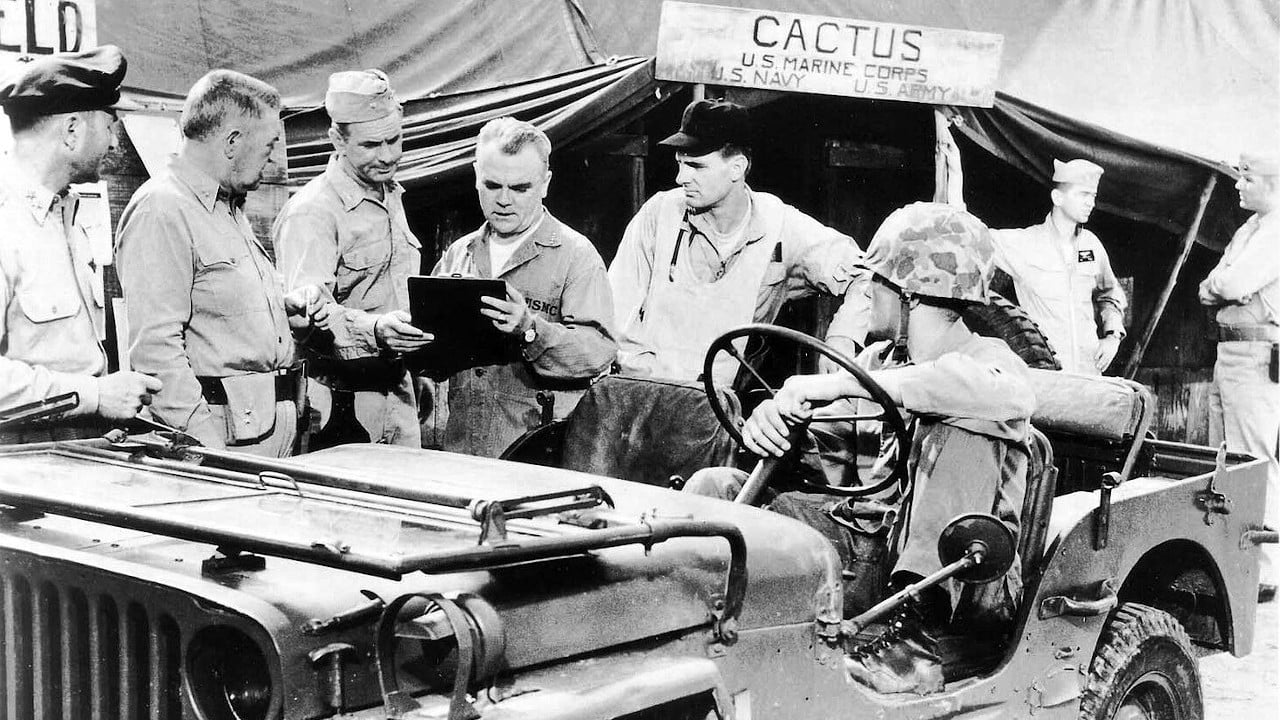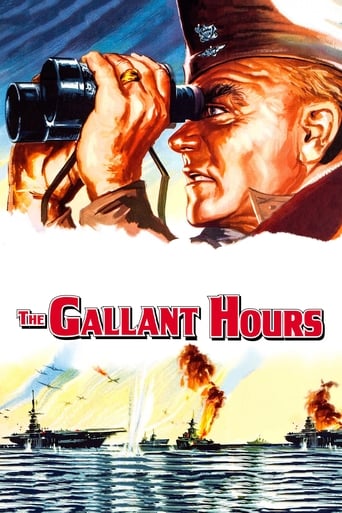

A look at the senior officers in Halsey's fleet and under his command. However, it was strangely uninvolving, since we knew that the U.S. won the war, won the battle for Guadalcanal, and that Halsey survived the war and retired a four star admiral. What almost ruined the movie for me was the too reverent chorus that played throughout the movie, which would have more suitable in a movie about Jesus Christ or one of the saints. The wa wa chorus was actually intrusive at times and I found myself grimacing when it started up.
... View MoreI don't know if I'll ever get back to it for a second watch, but I grasped what I could in this profile of Fleet Adm. William F. Halsey Jr., played by James Cagney as he was preparing to retire himself. It's ironic that the opening scene has Halsey preparing to retreat to his cabin to change into civilian clothes. Soft spoken and attentive, he is beloved and gives talks to his men-in groups, one on one and treating everyone of them like they matter. This is Cagney at his most subtle, and at times, I wanted to reach through the screen to grab a hug: from the fictional version of the character, from the actor, and from the spirits of both men who gave so much of themselves. Since the real Halsey had died the previous year, there was a legend surrounding his life, so it makes sense that they cut out anything that would make him seem anything less than a perfect leader of the U.S. military. One special moment comes in my memory of James Cagney when he was alive: being introduced for a profile in "A Night of 100 Stars". Cagney seemed to be in tears as he accepted this honor, not saying a word, but realizing the impact he made on the world of film. That honor is felt here for Halsey, whether getting bad news about his own son, submitting to shots reluctantly as part of a promise to his departing aide (Dennis Weaver), and sharing the harsh realities of war with an underling he hoped to raise in rank who blamed himself for the loss of nine planes. Cagney takes those nine planes on, adds on ships, submarines and land troops onto his own list of regretful losses. The story surrounds his command of Guadalcanal, so there's plenty of detail to be dramatized and documented in two hours. Through the narration of director Robert Montgomery, dozens of other officials, both enemy and ally, are introduced. But as taxing as it is to remember them all, when the camera is on Cagney, there's an invisible halo shining on him with the haunting music that practically proclaims Halsey's sainthood, which from what I've read was a total contrast to how he is portrayed here. Cagney just makes all this hero worship tolerable, and I felt myself falling into the pattern of feeling like I was among the truly divine men I knew really nothing of. Maybe one day, we'll get the truth, but for how, this sanitized portrayal will have to do.
... View MoreMovie buffs who crave action may not find this film to their liking. But, those who enjoy history and most war movie fans will enjoy "The Gallant Hours." This is one of the very best war films ever made in which there are no action scenes, battles or combat shown. The plot is excellent, the screenplay is superb, and it's all made quite riveting by the performances of the cast. This is a story about a few weeks of World War II in the Pacific Theater and Admiral William F. "Bull" Halsey, Jr. It covers the time under Halsey's watch when the tide of the war turned from Japanese domination to the start of Japan's retreat. James Cagney gives one of the best performances of his career as Halsey. Cagney was a very talented performer. He could act, sing and dance. Unfortunately, he didn't get as many top dramatic or musical films in which he could use his tremendous talents. That's because his star rose during the halcyon years of the public's and Hollywood's fascination with gangsters, organized crime and local government corruption. Cagney is one of those actors who became so identified with the gangster persona that he didn't get many other starring roles. But those he did – comedy, musical, or other action films, all were very good. It does seem ironic indeed, that the Oscar he won was for his role as George M. Cohan in "Yankee Doodle Dandy." Cagney played a lively, magnanimous Cohan – a master entertainer, playwright, composer, singer, dancer and producer. In "The Gallant Hours," Cagney is more reserved as Admiral "Bull" Halsey, to suit the character. But he gives a thoughtful, intelligent performance for the man who was in the spotlight at the time and who's leadership helped set the course for an Allied victory in the Pacific. This film has tremendous historical value in its focus on command decisions, the careful deliberations, the concerns, worries, efforts to discover and outguess enemy plans and tactics, and the risks military commanders and leaders often have to weigh and take. In one scene, Cagney's Halsey says, "There are no great men. There are only great challenges that ordinary men are forced by circumstance to meet." It's a brilliant film all around, and should be in every war film library. Other reviewers have noted a discrepancy in the timing of Japanese Admiral Yamamoto's demise. That should be noted for its misrepresentation in the film. All of the cast excel in this film. It's a fine tribute to a fine man and leader, and to all the Navy brass and other commanders in the Pacific theater for their dedication and service in World War II. This film was worthy of 10 stars but for one thing. The U.S. Naval Academy chorus, however good it may be, was just out of place providing the background music. It quickly became a droning distraction and detracted from the film.
... View MoreMy first viewing was a surprise. I had no idea that serious documentary style film-making occurred before the 1970s. The second surprise was during the credits. James Gagney provided funding for this film.Despite Admiral Halsey's reputation, this film paints him as a reasoned thoughtful man who respected his subordinate officers and their men. Highly accurate the film paints the struggle to hold Guadalcanal against almost impossible odds.If you, as a film lover, are looking for a high action film, you might want to pass. This is more the study of the man who won the battle of Guadalcanal with thought, foresight, and more than a touch of daring. In fact there is not one single battle scene with the only real violence taking place when "Washing Machine Charlie" bombs a land base that Halsey happens to be on.The film chronicles the short span of time (five weeks) between Halsey taking over the command of South Pacific forces and the victory over Yamamoto at Guadalcanal.The film is also interesting in that Halsey is never once depicted as bloodthirsty or violent, only that he is determined to rise to the challenge of the Japanese Navy's superior numbers and hold a hard won beachhead on the aforementioned island.Admiral Halsey is quoted as saying: "There are no great men, only great challenges that ordinary men are forced by circumstances to meet." This film matches that sentiment in its script, direction, and production values.The only thing I found the least bit annoying about the film was the chorus in the background. Beyond that this film stands up well even today, some fifty years after it was made.A must see for anyone interested in Halsey, the U.S. Navy during World War II, logistics, and/or strategy.
... View More